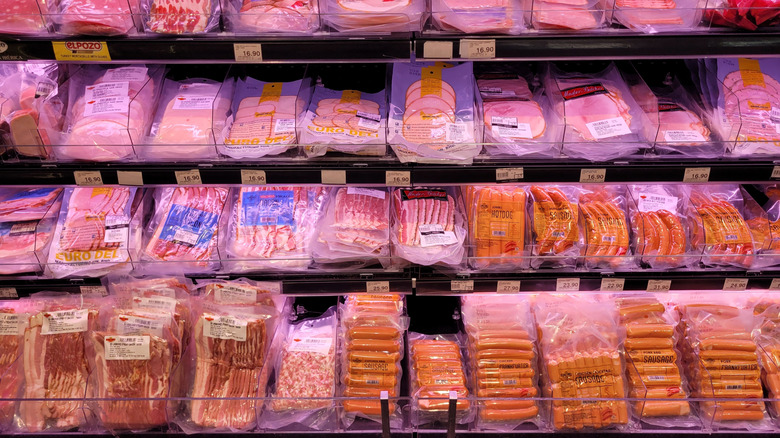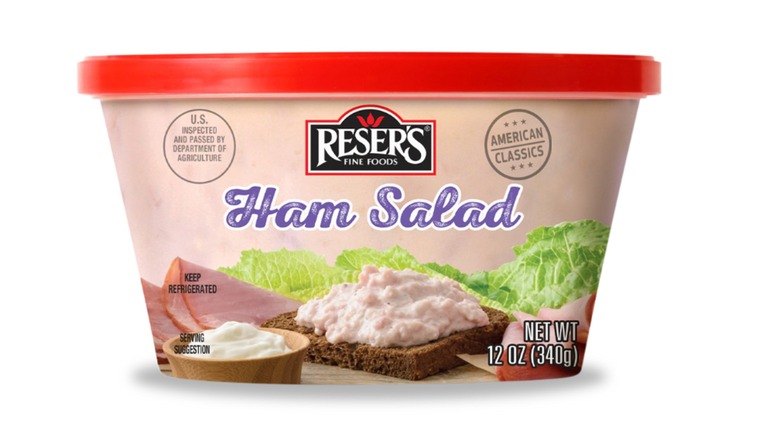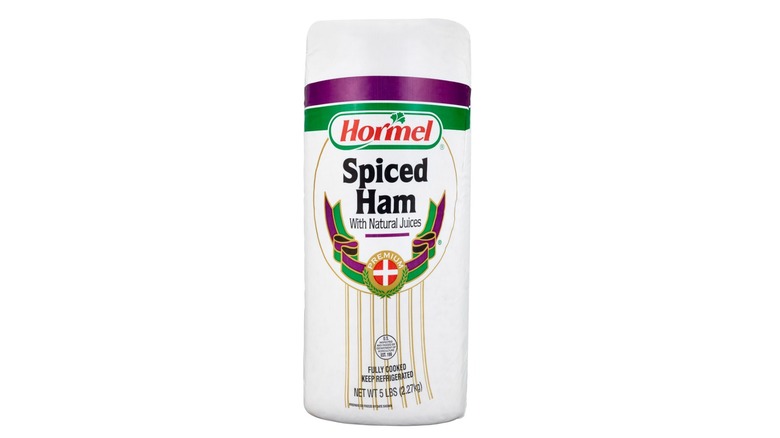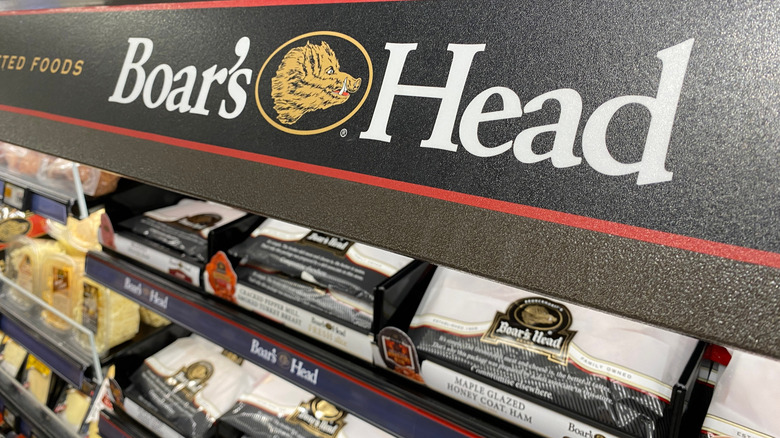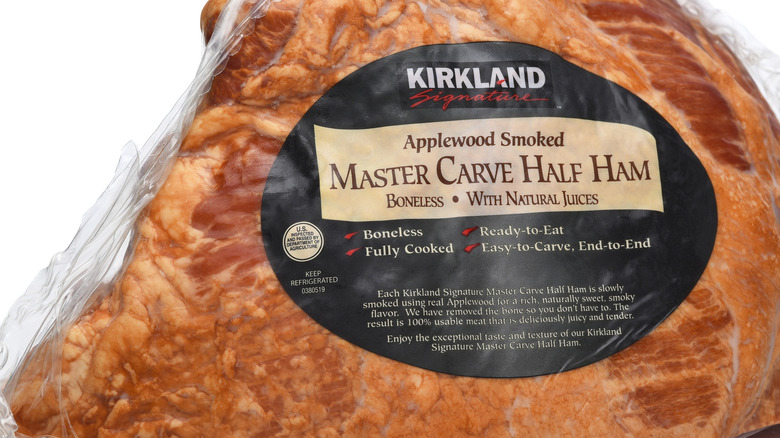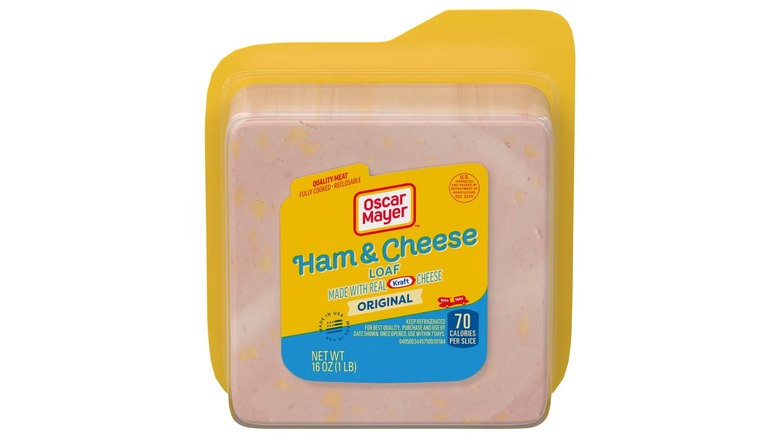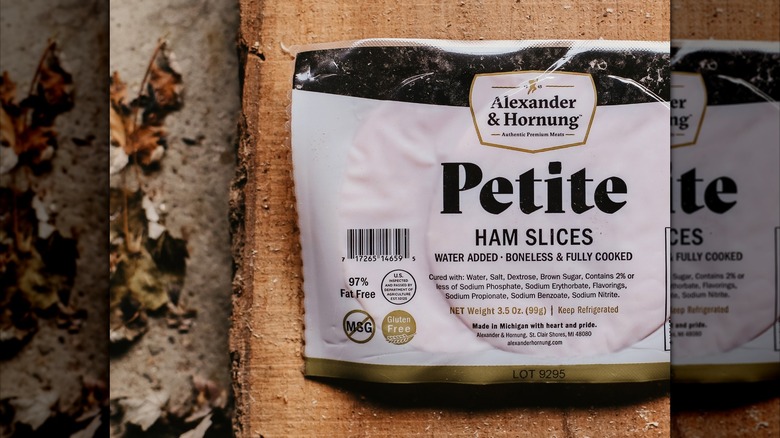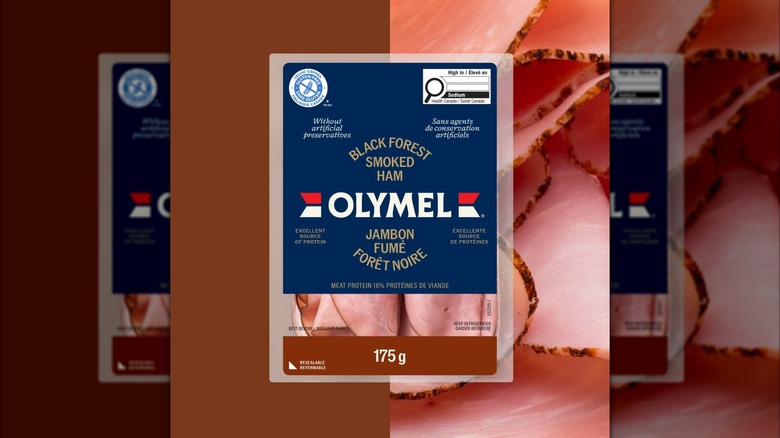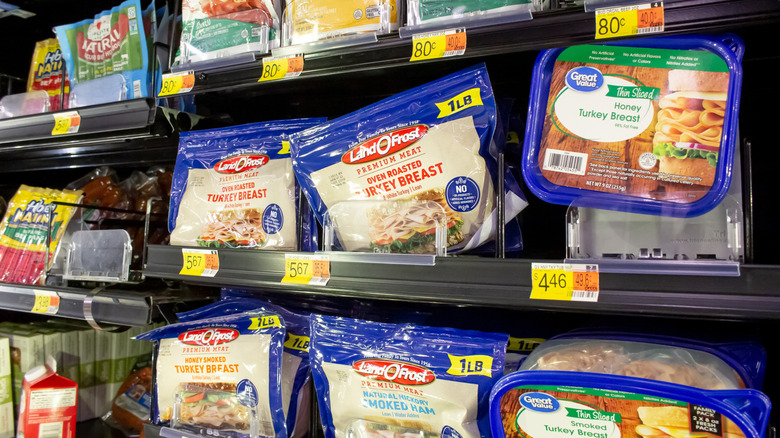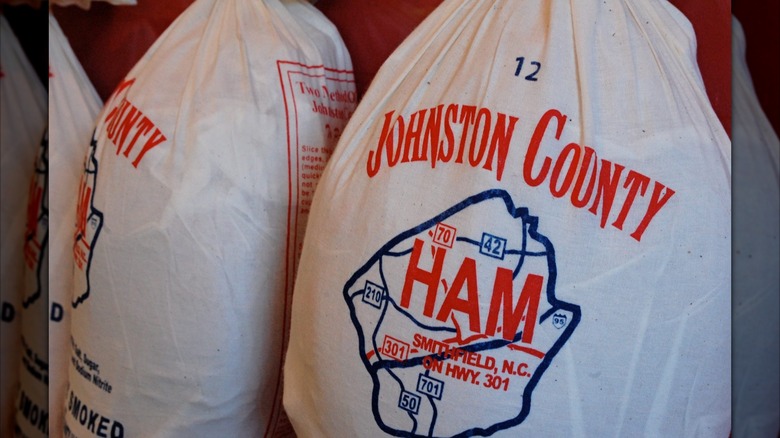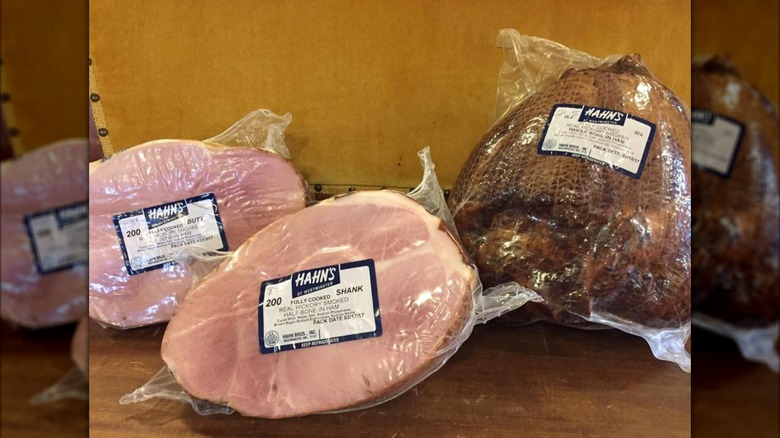14 Ham Recalls That Affected Millions
A lot of ham comes ready to eat. Think jamón ibérico or prosciutto, which you can snack on as soon as you open the packaging, no need to break out a skillet. Even your holiday ham, which you probably bake for hours in the oven, is technically already cooked and just needs to be heated all the way through. However, don't assume that just because your packaged pork is marked as safe for consumption that it's also free from food-borne pathogens.
Ham makes a comfy home for common bacteria including E. coli, salmonella, and listeria monocytogenes — all of which can be blamed for a variety of food recalls across the grocery store, not just in the deli section. It's also a host for less-common pathogens, including trichinae (a parasite derived from the pig itself), staph, and mold.
The best way to avoid anything nasty is by handling the meat appropriately, thoroughly heating it to an internal temperature of 160 degrees Fahrenheit or more and, of course, keeping an eye out for ham recalls and tossing out anything suspect you might have in the fridge. If you think ham recalls aren't all that common, think again. More often than you'd expect, the ham we eat can contain unlisted allergens or dangerous bacteria, affecting millions or even resulting in deaths. Here are some of the more recent ham recalls of the last decade.
Public warned away from ham salad due to breadcrumb contamination (2025)
While a ham recall is sometimes issued due to a problem with the meat itself, other times the product has come into contact with another potentially dangerous ingredient. This was the case in 2025, when the U.S. Department of Agriculture's Food Safety and Inspection Service (FSIS) issued a public health alert for Reser's Fine Foods and Molly's Kitchen ham salads. Both spreads contained breadcrumbs that had previously been recalled, due to listeria monocytogenes contamination, by manufacturer Newly Weds Foods.
A public health alert differs slightly from an official recall. Simply put, the FSIS issues a public health alert for possible concerns and risks. For example, if there are emerging cases of a food-borne illness –– but the specific item causing the issue hasn't yet been identified –– the FSIS may urge consumers to exercise caution and best hygiene practices with a large swath of potential products. Under certain circumstances, the food items have already been removed from public circulation. In the case of ham salad recalls in 2025, the FSIS alert came about after Reser's Fine Foods realized it had used the tainted breadcrumbs in its salad.
Hormel deli ham recalled for misbranding (2024)
In 2024, Hormel recalled nearly half a ton of its spiced deli ham, as it was discovered that the product, which had been distributed throughout the state of Pennsylvania, contained an undeclared allergen: milk. While it doesn't typically contain any milk, deli employees began reporting that they were seeing bits of cheese in the ham as they sliced it for customers. Hormel makes another deli item that contains cheese — the brand's ham and cheese loaf — so perhaps there was a case of the wrong item ending up with the wrong packaging.
Whatever the source of the problem, though, Hormel was luckily able to recover nearly all of the recalled ham. While the misbranding might not seem like a huge issue to most, for those with milk allergies, eating the processed pork could have caused serious illness. Separate from lactose intolerance, for someone with a milk allergy, consuming dairy products can result in unpleasant symptoms including gastrointestinal distress, throat or tongue swelling, wheezing, and hives.
Ham croquettes recalled due to lack of inspection, allergens (2024)
In 2024, food products supplier A Tu Gusto recalled more than 7,600 pounds of frozen croquettes –– including ham croquettes –– after two big issues were discovered. First, the microwave snacks contained multiple allergens that were not declared on the boxes' labels, including soy, sesame seeds, and wheat.
However, apart from this glaring issue, the FSIS announcement noted that the items had been "produced without the benefit of federal inspection." Failing to comply with the proper check-ups is a common reason for food recalls and basically means that a company didn't receive the necessary government signoffs for legal food production. Not only must meat manufacturers fulfill requirements related to preventing food safety hazards and sanitation, but even their facility construction, layout, and equipment are subject to examination and supervision. In short, A Tu Gusto did not make its croquettes in an environment that the government deemed safe.
Boar's Head massive, deadly recall (2024)
If you're familiar with just a single incident on this list, it's probably going to be the 2024 Boar's Head recall. In an event that seemed to steadily get worse, with a list that included over 70 products, Boar's Head recalled millions of pounds of its deli meats –– including multiple types of ham –– after it uncovered a massive listeria outbreak. In total, the Centers for Disease Control and Prevention (CDC) recorded 10 deaths and 60 hospitalizations across 19 states linked to the brand's contaminated items.
How does such a terrible outbreak like this occur? Investigations and reports found that the meat production plants were operating in risky environments and facilities that weren't up to code, with inspectors finding all sorts of unsavory items, including insects, mold, and mildew. The continuous lack of proper sanitation and cleanliness provided the perfect conditions for listeria monocytogenes to thrive.
German prosciutto recalled due to lack of equivalent inspection (2024)
As discussed, meat products and processors are subject to federal inspection in the U.S., but what happens when a company ships in ham from another country? Are foreign manufacturers required to exercise the same scrutiny as the U.S. government? Yes — and that's why, in 2024, ConSup North America had to recall more than 85,000 pounds of prosciutto, when it was discovered that a German establishment produced the cured ham without "the benefit of equivalent inspection."
The FSIS looks at other countries' food safety inspection programs to determine whether they provide a level of oversight comparable to what the item would receive domestically. Any meat or egg imports, for example, must meet certain standards regarding facility sanitation, proper labeling, and humane animal treatment. Currently, many German pork products are banned from entering the U.S. until the FSIS can study and reinstate its health standards equivalency.
Costco Kirkland ham suspected to contain listeria (2023)
Costco has been at the center of numerous recalls. In 2023, the store's Kirkland Signature boneless applewood smoked hams, which are fully cooked and ready to carve for the holidays, received their own FSIS public health alert. Through testing, Sunnyvalley Smoked Meats (Costco's provider for this pork product) found that it might have been exposed to listeria monocytogenes in manufacturing facilities. An official recall was not issued, as it was expected that all of the impacted hams, which were distributed around California and Nevada, had been pulled from public sale by the time the FSIS issued the warning.
Listeria monocytogenes contamination is a serious issue and one of the most common reasons for food recalls. Although most people are not at high risk for contracting listeria when eating a contaminated item, certain populations are particularly susceptible, including the elderly or pregnant individuals. In certain situations, however, the bacteria can prove deadly, as was seen in a 2024 Boar's Head liverwurst recall.
Oscar Mayer ham and cheese loaf recalled for cross contamination (2022)
You've probably heard of cross contamination plenty of times. When cooking at home, for example, you know you shouldn't chop salad greens on the same cutting board you just used to slice up some raw chicken breast. However, cross contamination impacts food safety at the production level as well, as evidenced by the recall of Oscar Mayer's ham and cheese loaf in 2022.
That year, in one of Kraft Food's biggest recalls, the company ordered back more than a ton of the ham and cheese loaf because the ready-to-eat product had reportedly come into contact with equipment used to slice an "under-processed" food. Just like cutting fresh produce on the same surface as raw meat, this obviously led to some safety concerns. Kraft didn't specify what the under-processed item was, but no confirmed reports of any negative side effects had been made at the time of the recall.
Millions of pounds of ham and pepperoni recalled due to listeria (2021)
The Boar's Head catastrophe wasn't the only ham recall to affect literally millions of pounds of meat. In 2021, Alexander & Hornung recalled 2.3 million pounds of ham and pepperoni products due to, again, listeria fears. Thankfully, unlike the Boar's Head case, no one reported becoming ill, and no hospitalizations or deaths were linked to this outbreak.
Alexander & Hornung didn't notice the issue until the company tested some product samples and detected the presence of the potentially lethal bacteria. By that time, the contaminated pork had already been shipped out to retail stores across the country.
Further complicating things, listeria is a food-borne illness that can remain dormant long after an individual eats an impacted item. For example, someone could pick up and eat a packet of the affected ham but pay no mind to the recall since they don't immediately fall ill. Although symptoms typically appear within two weeks, they might not notice anything for up to two months, by which point enough time has passed that they can't even connect the dots as to why they are sick.
Olymel ham recalled after salmonella contamination (2021)
Processed, sliced, and cured meats are some of the most susceptible foods for listeria outbreaks. Soft cheeses, ready-to-eat sandwiches, and salads are also top contenders for harboring the bacteria. While it may seem like most ham recalls are linked to listeria, there are plenty of other contaminants that can impact pork products and make them dangerous to consume. In 2021, Olymel, a Canadian-based food processor, recalled nearly 7,000 pounds of Celebrity-branded deli ham. The company suspected that the items had been contaminated with salmonella enteritidis.
Salmonella is one of the top causes of food-borne illnesses, but luckily most cases of salmonellosis are mild and limited to fever and gastrointestinal symptoms that can last up to a week. Sometimes, the abdominal issues can become severe enough to lead to dehydration and consequent hospitalization. The elderly, children, and those with weakened immune systems are at a higher risk for serious complications.
Ham and cheese sandwiches recalled due to foreign materials (2019)
Beyond dodging government inspection or the outbreak of potentially life-threatening bacteria, another reason that food is recalled is due to foreign materials. Typically, these objects are bits of plastic, rubber, or glass that accidentally end up in products during processing. Other times, it's natural elements like rocks and sticks that miraculously find their way from the harvesting fields all the way to your pantry.
In 2019, J&J Snack Foods Handhelds recalled nearly 60,000 pounds of Bremer stuffed sandwiches. The official FSIS announcement noted that the handheld, microwaveable sandwiches could contain bits of plastic. While no negative consequences in relation to eating the foreign object were reported, the issue was only discovered after consumers began complaining. While eating plastic isn't generally considered toxic, it can cause choking, throat or esophagus damage, or issues like lodging or bleeding in the digestive tract.
Land O' Frost ham recalled for incorrect packaging (2018)
Sometimes, a product is recalled because its label doesn't list a certain allergen or ingredient. Other times, though, food is recalled because it's in the wrong packaging altogether. In 2018, Land O' Frost recalled nearly 5,000 pounds of black forest ham because of one such mix-up. The packaging for these pork slices is made up of two parts, including the front cover that correctly listed the contained black forest ham. However, the back of the package was what the company uses for its honey-smoked turkey breast — which, as you can imagine, led to some confused customers.
The product had been shipped out to retail stores across five states, and the issue wasn't realized until consumers complained that the nutrition facts and ingredient info didn't match up with what they thought was ham. However, there were no problems reported beyond mere annoyances.
Johnston County Hams recalled due to listeria (2018)
In 2018, Johnston County Hams recalled nearly 90,000 pounds of ready-to-eat products, including deli, country, and boneless glazed hams among others. Shortly before the recall was issued, an individual reported eating one of the pork items then falling ill with listeriosis, prompting an investigation by the FSIS, CDC, and state organizations. Their joint efforts began connecting the dots and determined that a listeriosis outbreak had been occurring over the course of more than a year, amounting to four reported illnesses, one of which resulted in death.
Additionally, when the FSIS looked at historic samples from a Johnston County Hams facility, the agency found that not only did the deli ham contain the bacteria in 2018 –– at the time of the outbreak –– but also two years prior in 2016. As such, it's safe to assume that the listeriosis contamination was an ongoing issue. It's no surprise that, in 2019, Johnston County Hams shuttered its doors after more than 70 years in business.
Hahn Brothers ham recalled for malted barley (2017)
When you think of major allergens that could result in a product recall, you might think of what the FSIS refers to as the "Big 9," or the foods most associated with allergies across the U.S. population. These common triggers include milk, eggs, fish, shellfish, tree nuts, peanuts, wheat, soybeans, and sesame. However, in 2017, Hahn Brothers recalled more than 115,000 pounds of ready-to-eat ham due to worries that it could cause an allergic reaction in unsuspecting consumers — and the ingredient at fault was none of the so-called Big 9. Instead, it was malted barley.
While barley is not considered a significant irritant, it does contain gluten and can therefore cause problems for those with celiac disease or gluten intolerance. The former impacts at least one out of 133 Americans while the latter affects up to 6% of the population (via Beyond Celiac). Additionally, for those with an actual barley allergy, an allergic reaction, though often treatable with antihistamines, can sometimes lead to anaphylaxis.
Quiche recalled due to lack of import inspection (2017)
We know that the U.S. government places strict requirements on domestic meat producers and mandates that foreign companies meet certain standards before exporting their goods. However, it also requires imported foods to undergo re-inspection upon entering the country. If the import isn't checked out by the FSIS, it can be recalled. This is exactly what happened in 2017 when Canadian producer Maple Leaf Foods had to recall nearly 25,000 pounds of fully cooked ham and cheese quiches that were destined for grocery stores like H-E-B.
According to the official recall, it doesn't sound as if Maple Leaf Foods was trying to do anything sneaky. In fact, the brand reached out to the FSIS inquiring about the shipment, at which point it was discovered the products never made it through an inspection upon entering the country. By that point, the quiches had already gone out to retailers nationwide and had to be recalled.
